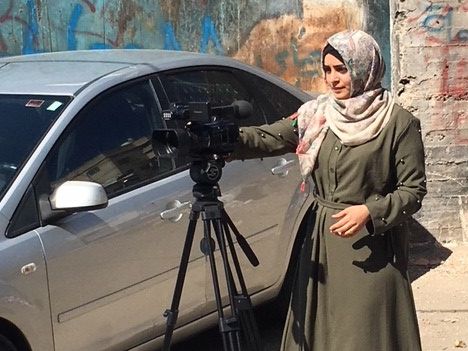Within a given society, culture can be a space where people are able to connect across dividing lines. Music, film, and art can all play a connecting role between genders, ages, ethnicities, and religions. Culture has the ability to bridge differences, to allow marginalised voices to be heard, to let the silenced speak.
Empowering women using film
This gender pilot project in Palestine, created in collaboration with Palestinian NGO MEND, focussed on empowering aspiring female film makers living in the Shu’fat refugee camp to address gender issues they were personally affected by through participatory video methodology. The topics chosen varied from early marriage and divorce, to recycling and dabke dancing; the first two being taboo topics, forbidden from public discourse. In the film about divorce, Sama had got married at the age of 17, and from the onset suffered from domestic violence and abuse. After the filming, public showings and discussions were organised both inside and out of the camp. It was during these events that the true impact of the project was realised. In her film, Sama refused to show her face in fear of being recognised and socially shamed. During the first public showing of her film, Afaf not only allowed herself to be identified but she stood up and publicly spoke about her experience. She transformed from a depressed, somewhat hidden woman to a self-confident and aware spokeswoman talking about a once silenced issue.
Raising of the voices of the marginalised is not easy, but film can provide that platform and safe space to do so. Not only can filmmaking empower those involved in the process, but it can have a wider effect of stimulating social and behavioural change. With increased understanding and empathy of one another, conflict is less likely to erupt. Film can be this tool for peace.
Contact
Activiteiten & resultaten
Successful training
During the course of the project, six women were trained in participatory video methodology. There were three sets of workshops which focussed on the following: technical instructions on how to use a camera, through interactive games and peer feedback, how to develop their own stories and scripts and filming, and taking on different roles for each film. The workshops increased the capacities of the women themselves and built up their own confidence, self-assurance and skills set. The discussions proved the wider impact of the project beyond the individual women; awareness was raised on gender-specific issues that women face and follow-up meetings with relevant Ministers and stakeholders were organised as a direct response to them watching the films. Due to the success of this pilot project, some of the lessons learned are being implemented in the Lebanon gender pilot.




